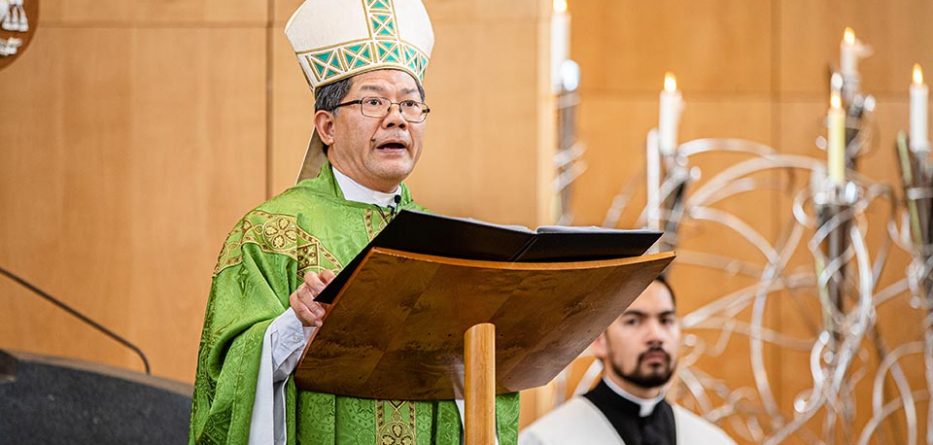Most Reverend Vincent Long Van Nguyen OFM Conv DD STL, Bishop of Parramatta
Homily for the 13th Sunday in Ordinary Time Year A 2020 at St Paul the Apostle Parish, Winston Hills
Readings: 2 Kings 4:8-16; Romans 6:3-11; Matthew 10:37-42
28 June 2020
Meeting God beyond one’s familial and tribal boundary
Dear friends,
They say a crisis can lead to an opportunity. As people of God on a journey, we are open to be led beyond our limited horizons. During this time of a protracted pandemic, while we yearn for a community gathered in worship, fellowship, and mission, we also learn to meet God and convey His presence in new ways. We learn to be His living temple, a Church without walls.
Pope Francis made an insightful comment on the passage from the Apocalypse where it says: “Behold, I stand at the door and knock”. Traditionally we have an image of Christ outside a door.
But the Pope turns the image inside out, saying “Today Christ is knocking from inside the Church and wants to get out.” With this, the Pope encourages us not to limit our faith to a building. We must use this opportunity to deepen our relationship with Christ and our sense of being Church. We must learn to encounter the living Christ beyond fixed walls and boundaries. More importantly, we must learn to witness to Him in our acts of solidarity, hospitality, and service to the least of His brothers and sisters.
Scriptures this Sunday challenge us to be open to God who comes into our lives, especially through hidden and unexpected ways. In the first reading from the Second Book of Kings, we hear how the prophet Elisha was welcomed and treated with extraordinary hospitality by a foreign woman. What is interesting in this story is that she is the main protagonist and not her husband. It was she who recognised Elisha as “the holy man of God” and took the initiative to build a guest room for him.
In a patriarchal society where women often remain inferior and invisible, the Shunammite woman stands alongside with other female characters like Ruth and the hemorrhaging woman who was healed by Jesus. They were not passive recipients but active agents who stretched the limits imposed on them by others. The story makes clear that God does not act within the confines of a preferred gender, race, tribe, or social status. The foreign woman found favour with God because she had gone beyond the prescribed convention in accepting and serving an outsider. Outsiders become insiders.
In the Gospel, Jesus takes the injunction of welcoming the strangers to a new level. In the Old Testament lesson, the foreign woman recognised Elisha – a person superior to them – to be the man of God and treated him accordingly.
Jesus, however, challenges us even more. We are told not only to welcome a superior person – the prophet or the holy man – but also to honour God in the little ones – people considered inferior to us. “If anyone gives so much as a cup of cold water to one of these little ones… he will most certainly not lose his reward.”
This is consistent with the way Jesus engaged with others. Not only did he reach out the outcasts such as widows, Samaritans, lepers, tax collectors et cetera; he also taught us that God identifies with them and so to serve them is to honour God himself. In Jesus who surrounds himself with the outcast, we see a God of solidarity and vulnerability. In Jesus, we meet a God who disturbs our comfort and who pushes us out to the periphery to be with the least of His brothers and sisters. He subverts the order: outsiders become insiders and vice versa.
Christian discipleship is never for the faint-hearted. Jesus uses very strong images of family divisions to emphasise the importance of the undivided loyalty. A total and radical commitment is needed for the life of a disciple. This fidelity would be preferred to even family ties. In Jesus, God did the unthinkable. He started a new family, a new bond that would cut through the traditional structure. This is what it means when Jesus says, “Anyone who prefers mother or father to me is unworthy of me.” It is a call to us to be loyal first and foremost to God and the works of His Kingdom.
Dear friends,
The Word of God today speaks to us about the God of surprises. It challenges us to broaden our minds, widen our horizons, enlarge our hearts, and stretch our capacity to love. We need to be alert and open to God’s saving grace even in the most unlikely places and people. Our Christian ID card contains not our blood type, gender, nationality, status but the mark of our love and service to others.
In the light of the Scripture today, we pledge to create an environment where fear of differences is replaced by encouraging all people to share their gifts. The world often makes outsiders into enemies or rivals, but God calls us to greater openness to the surprising ways in which he conveys his presence and power.
Let us commit ourselves to walk as pilgrims open to be formed and enriched by the journey. May we in all the upheaval and chaos around us learn to act justly, love tenderly and walk humbly with the God of surprises.








